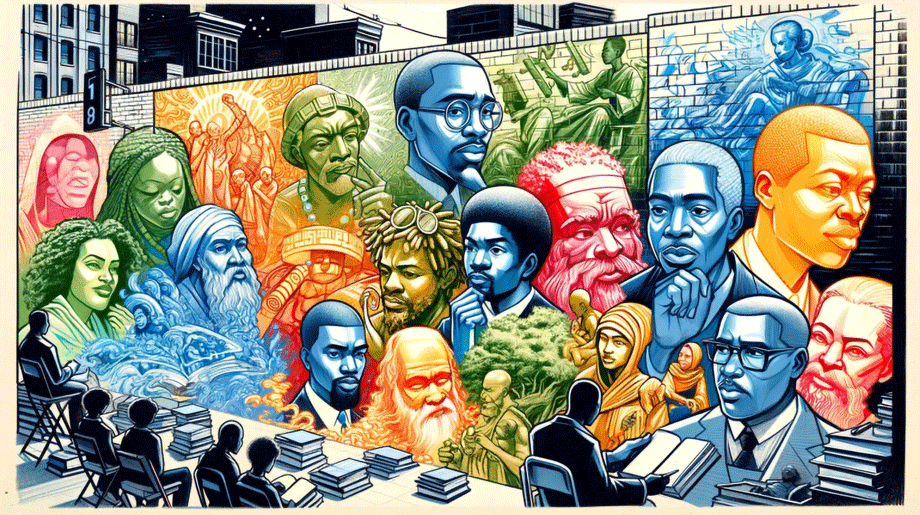African Wisdom for Today’s Global Challenges

 Madi Ditmars is an anthropologist and educator whose research and professional interests include indigenous and local knowledge systems, as well as sustainable human development practices. She currently serves as Education Development Officer at the African Studies Centre Leiden.
Madi Ditmars is an anthropologist and educator whose research and professional interests include indigenous and local knowledge systems, as well as sustainable human development practices. She currently serves as Education Development Officer at the African Studies Centre Leiden.
Being human is always shaped by a particular ontology (the philosophical study of being). African philosophies, rooted in diverse societies and traditions, emphasise the interdependence of humans as social, collective, and cosmological beings. In an age defined by climate change, multiple existential crises, social fragmentation and epistemic injustice, African worldviews offer profound insights that could strengthen human resilience and foster global reconciliation. This blog explores how ontologies from across the African continent provide pathways for addressing today’s most urgent challenges while affirming the enduring relevance of African wisdom in shaping a more just, inclusive, and sustainable world.
Spanning across a multitude of societies, languages, and belief systems, African philosophy embodies the wisdom, values, and inquiries of generations as a dynamic tapestry of thought, reflecting the interplay of intellectual traditions across the vast and vibrant continent. It is plausible to accept that philosophical thinking originated in Africa. The Ancient Greek word philosophos, interpreted as ‘lover of wisdom’, is a translation of the Egyptian concept mer-rekh, meaning 'lover of wisdom,' or ‘lover of knowledge’.
The core of African philosophy
The notion of African philosophy broadly embraces African ways of life and thought: worldviews, knowledge, wisdom, traditions, belief systems and concepts of reality that were preserved and conveyed through generations. These insights were historically transmitted through oral traditions - rituals, myths, proverbs, epics, folktales, and songs, from Berber holy men to Yoruba talking drummers, Kenyan sages, Amhara zar healers, Dinka diviners, Batwa storytellers, Tonga praise poets, and Ndebele artisans.

The Teachings of the Vizier Ptahhotep (Egyptian 5th Dynasty, 2388–2356 BCE) is the oldest preserved doctrine of wisdom embodied in Ma'at - the daughter of the Egyptian Sun god Ra. Upholding the cosmic order against chaos, Ma’at embodies principles of truth, balance, order, harmony, reciprocity, propriety, and justice. To ‘live in Ma’at’ meant acting with honour and honesty in all aspects of life - from personal relationships to societal conduct and environmental responsibility - in order to align human action with universal balance.
 This theme resonates with contemporary African worldviews. For instance, the Akan–Ga theory of personhood believes a child is born with okra (potential for personhood), and becomes a full person by living ethically, fulfilling obligations, and contributing to the community. In Yorùbá thought, wisdom is linked to the ethical ideal of Omolúàbí -the cultivation of good character, morality, and virtue, where the pursuit of ìwà pẹ̀lẹ́ (gentle, balanced character) depends on the proper balance of àṣẹ, the vital force. Similarly, the Bantu philosophy of Ubuntu aligns human action with interconnectedness, community, shared responsibility, and human dignity. It offers a framework for reconciliation and social cohesion, as Eze observed during the Mind & Life Digital Dialogues, “We find our shared humanity in the encounter with others.”
This theme resonates with contemporary African worldviews. For instance, the Akan–Ga theory of personhood believes a child is born with okra (potential for personhood), and becomes a full person by living ethically, fulfilling obligations, and contributing to the community. In Yorùbá thought, wisdom is linked to the ethical ideal of Omolúàbí -the cultivation of good character, morality, and virtue, where the pursuit of ìwà pẹ̀lẹ́ (gentle, balanced character) depends on the proper balance of àṣẹ, the vital force. Similarly, the Bantu philosophy of Ubuntu aligns human action with interconnectedness, community, shared responsibility, and human dignity. It offers a framework for reconciliation and social cohesion, as Eze observed during the Mind & Life Digital Dialogues, “We find our shared humanity in the encounter with others.”
While both Western and African philosophies are grounded in ontology, the former often emphasise atomistic autonomy, conceiving individuals as distinct, separable, and independent. By contrast, African philosophy is deeply intertwined with spirituality and cosmology, situating human existence within a web of interconnections structured around two key dimensions. First, Personhood through Community is central to philosophical traditions across the continent. From the Akan of West Africa to the Swahili traditions of East Africa and the Shona of Southern Africa, personhood is realised through social and ethical participation: one becomes a person by cultivating relationships, fulfilling responsibilities, and being recognised by others. Second, Cosmological Interdependence in African ontologies views the cosmos as alive, infused with spiritual presence and moral significance. From ancient Egyptian thought to the cosmologies of the Dogon, Maasai, and San, it is believed that all beings - ancestors, spirits, humans, and nature - are interconnected and mutually dependent within the wider universe. Together, these insights offer indispensable perspectives for addressing contemporary global challenges.
 African ontologies for today's global challenges
African ontologies for today's global challenges
African wisdom challenges the assumed universality of Western philosophical categories, offering alternative understandings of human existence, experience, and truth, and provide a foundation for the decolonial turn. Rooted in lived traditions yet responsive to global crises, African worldviews do not merely offer alternative perspectives but transformative tools that are urgently needed in our time. They guide us to treat the Earth as a living entity and humanity as its custodian - an ethos that demands ecological stewardship, challenges exploitative models of development, and advances frameworks of balance and harmony with the environment. Crucially, in an age of alienation and technological acceleration, African ontologies restore purpose and belonging. Traditions of ritual, ancestor veneration, etc. bind individuals to collective histories and responsibilities.
By affirming that personhood is relational, African philosophies remind us that epidemics, forced migrations, or climate crises cannot be solved through isolationist thinking but require empathy and recognition of our shared destiny. Furthermore, many African societies emphasise consensus, reconciliation, and shared responsibility, which provide tools for intercultural dialogue, help rebuild polarised communities, and model alternatives to adversarial politics and punitive justice systems.
Cultivating more holistic approaches that integrate spiritual, moral, and social dimensions in addressing injustices, conflicts, and discrimination will transcend purely material considerations and re-centre humanity within their webs of relationship, responsibility, and meaning.
African ontologies should gain greater recognition and impact on the global stage through a range of interlinked strategies, including integrating African traditions, languages, and philosophies into education reforms and curricula, as well as fostering collaborative research on African approaches to pressing global challenges. Equally important is embedding relational worldviews into social and environmental policies, and showcasing alternative health practices and climate-smart agricultural knowledge engrained in African traditions.
Digital platforms and tools can play a vital role in preserving and disseminating African knowledge systems, while the popularisation of African wisdom in media, literature, and cultural events can bring these perspectives into wider public consciousness.
Reimagining how we coexist
Embracing African philosophy is not merely an act of intellectual inclusivity - it is a reimagining of how humanity can coexist with itself, with nature, and with the cosmos. An enhanced African ontological consciousness can contribute to a more balanced global discourse and help create a just, inclusive, and sustainable future. Past and present African philosophers have vastly shaped our understanding of the world, and their wisdom continues to illuminate new possibilities for the course of human thought.
Would you like to comment? Please do! The ASCL reserves the right to edit, shorten or reject submitted comments.


Add new comment